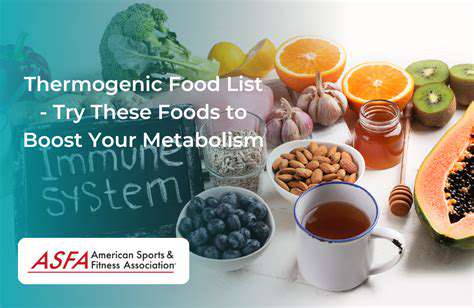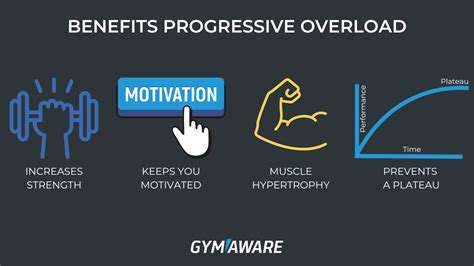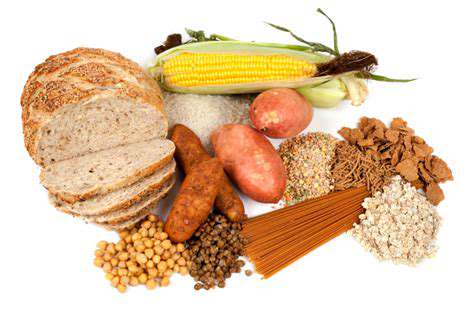Best Nutrition for Building Muscle in Your 40s+
Prioritizing Protein Intake: The Building Blocks of Muscle
Understanding the Importance of Protein
Protein is crucial for building and repairing tissues, including muscle. It's a complex molecule composed of amino acids, which are essential for various bodily functions. Adequate protein intake is paramount for individuals looking to increase muscle mass and strength. Without sufficient protein, the body struggles to synthesize new muscle fibers, hindering progress in bodybuilding and general fitness goals. A diet rich in high-quality protein sources is a cornerstone of any effective muscle-building strategy.
The process of muscle growth, known as hypertrophy, relies heavily on protein. When we exercise, tiny tears form in muscle fibers. Protein provides the building blocks – amino acids – necessary to repair these tears and create even stronger, larger muscle fibers. Ignoring protein intake limits this vital repair process, ultimately impacting muscle growth.
Choosing the Right Protein Sources
Not all proteins are created equal. Lean meats, poultry, fish, eggs, and dairy products are excellent sources of high-quality protein. These foods contain a complete amino acid profile, meaning they provide all the essential amino acids the body needs. Plant-based protein sources like legumes, tofu, and quinoa are also valuable, but often require careful combination to ensure a complete amino acid profile.
Consider incorporating a variety of protein sources into your diet to maximize nutrient intake and ensure you're getting the full spectrum of essential amino acids. This diversity also contributes to a more balanced and nutritious diet overall. Understanding the protein content and nutritional value of different foods helps you make informed choices for optimal muscle growth.
Calculating Your Daily Protein Needs
Determining your individual protein needs depends on several factors, including your activity level, age, and fitness goals. Generally, athletes and individuals aiming for significant muscle growth require a higher protein intake compared to sedentary individuals. Consult with a registered dietitian or nutritionist to determine the appropriate daily protein intake tailored to your specific requirements.
Online protein calculators can provide a starting point, but they don't account for individual variations. Professional guidance allows for personalized recommendations based on your unique needs and body composition. Understanding your protein needs is a critical step toward optimizing your muscle-building efforts and achieving your fitness goals effectively.
Implementing Protein into Your Diet
Integrating protein into your daily diet doesn't have to be complicated. Incorporate lean protein sources into your meals and snacks throughout the day. Include lean proteins like chicken breast, fish, or beans in your lunches and dinners, and don't forget protein-rich snacks like Greek yogurt or protein shakes.
Consider protein supplementation as a way to supplement your diet. However, it's crucial to note that supplementation should be used as an aid, not a replacement, for a balanced diet rich in whole foods. A well-rounded approach, combining dietary protein intake with regular exercise and rest, is key to maximizing muscle-building potential.
Planning your meals ahead of time and preparing healthy protein-rich snacks can help you stay on track with your protein goals. This proactive approach ensures consistency and helps you achieve your desired muscle growth and fitness outcomes.
By strategically planning your meals and snacks, you can maintain a consistent protein intake, supporting your body's need for muscle repair and growth. This ultimately contributes to a more efficient and effective muscle-building process.
Carbohydrates for Energy and Muscle Support
Understanding the Role of Carbohydrates in Muscle Building
Carbohydrates are crucial for fueling your workouts and supporting muscle growth. They provide the body with readily available energy, particularly during high-intensity activities. When you consume carbohydrates, your body breaks them down into glucose, which is then used as fuel for your muscles. Adequate carbohydrate intake is essential to maximize performance and recovery, allowing you to push harder during training and repair muscle tissue effectively.
Types of Carbohydrates for Muscle Support
Not all carbohydrates are created equal. Complex carbohydrates, found in whole grains, fruits, and vegetables, provide sustained energy release and are packed with essential vitamins and minerals. Simple carbohydrates, found in processed foods and sugary drinks, offer a quick burst of energy but often lack the nutritional benefits of complex carbohydrates. Understanding the different types of carbohydrates is key to fueling your body effectively for muscle growth.
Carbohydrate Intake Timing for Optimal Results
The timing of your carbohydrate intake can significantly impact your muscle-building efforts. Consuming carbohydrates before and after workouts is crucial. Pre-workout carbohydrates provide the energy needed for your training session, while post-workout carbohydrates help replenish glycogen stores in your muscles, facilitating recovery and promoting muscle growth.
The Importance of Carbohydrate Loading Before Training
Carbohydrate loading, or increasing carbohydrate intake in the days leading up to a strenuous workout, can significantly improve performance. By maximizing glycogen stores, you provide your muscles with ample fuel for intense exercise, allowing you to lift heavier and push your limits further. This enhanced energy availability translates into better workout outcomes and ultimately contributes to accelerated muscle growth.
Carbohydrate Sources for Muscle Growth
A variety of carbohydrate-rich foods can support your muscle-building goals. Whole grains like brown rice and quinoa, fruits like bananas and berries, and vegetables like sweet potatoes are excellent sources of complex carbohydrates. Incorporating these foods into your diet will provide your body with the necessary nutrients for muscle growth and repair. Furthermore, understanding portion sizes is important to avoid overconsumption of calories and to ensure balanced nutrition.
Balancing Carbohydrates with Protein and Fats
Carbohydrates are vital, but they shouldn't be consumed in isolation. A balanced diet incorporating carbohydrates, protein, and healthy fats is essential for optimal muscle growth. Protein is crucial for building and repairing muscle tissue, while healthy fats provide essential nutrients and contribute to overall well-being. A balanced approach ensures that your body receives the necessary components to support muscle development and recovery effectively.
Individualized Carbohydrate Needs
Individual carbohydrate needs vary based on factors like activity level, training intensity, and body composition goals. Consult with a registered dietitian or nutritionist to determine the optimal carbohydrate intake for your specific needs. They can help you create a personalized meal plan that supports your muscle-building efforts while considering your unique requirements and preferences. This personalized approach is vital for achieving optimal results and ensuring your body receives the exact nutrients it needs for success.
Hydration and Recovery: Essential for Muscle Growth

Hydration Strategies for Optimal Performance
Proper hydration is crucial for athletic performance and overall well-being. Dehydration can significantly impair physical and cognitive function, leading to decreased endurance, muscle fatigue, and reduced reaction time. Staying adequately hydrated throughout the day, especially during and after exercise, is essential to maintain optimal performance levels and prevent potential health risks.
Choosing the right fluids is also important. While water is the simplest and most effective option, sports drinks can be beneficial for replenishing electrolytes lost through sweat, particularly during prolonged or intense exercise. Electrolyte imbalances can lead to cramps and other serious complications. Consider the duration and intensity of your activity when selecting your hydration strategy.
Importance of Post-Workout Recovery
Effective recovery strategies are just as vital as training itself. Rest and recovery allow the body to repair muscle tissue, replenish energy stores, and reduce the risk of injuries. Ignoring this crucial aspect can hinder progress, leading to decreased performance and increased susceptibility to illness.
Post-workout nutrition plays a critical role in recovery. Consuming a balanced meal or snack that includes protein and carbohydrates within a few hours of exercise can aid in muscle repair and glycogen replenishment. This helps to optimize the body's ability to recover and prepare for the next training session.
Nutrient Timing for Enhanced Recovery
The timing of nutrient intake can significantly impact recovery. Consuming protein and carbohydrates within the first hour after exercise is particularly beneficial for muscle protein synthesis and glycogen replenishment. This crucial window allows the body to optimize the repair and rebuilding processes.
Furthermore, incorporating nutrient-rich foods into your daily diet, such as fruits, vegetables, and lean proteins, can provide the body with the necessary vitamins and minerals for optimal recovery. This comprehensive approach ensures your body has the building blocks it needs to function at its peak.
The Role of Sleep in Muscle Recovery
Adequate sleep is often overlooked but is an essential component of the recovery process. During sleep, the body repairs muscle tissue, releases growth hormones, and consolidates memories. Insufficient sleep can hinder recovery, leading to decreased performance and increased risk of injury.
Aim for 7-9 hours of quality sleep each night to allow your body to effectively repair and rebuild. Creating a consistent sleep schedule and ensuring a dark, quiet, and cool sleep environment can significantly improve sleep quality and recovery.
Beyond Hydration: Other Recovery Techniques
Hydration and nutrition are not the only factors in effective recovery. Other techniques, such as active recovery, stretching, and massage, can also play a significant role. Active recovery involves engaging in light physical activity, such as a leisurely walk or gentle swim, to promote blood flow and reduce muscle soreness.
Stretching after exercise helps to improve flexibility and reduce muscle stiffness. Massage can also aid in relieving muscle tension, improving blood circulation, and reducing recovery time. Combining these techniques with proper hydration and nutrition creates a comprehensive approach to optimal recovery.
Read more about Best Nutrition for Building Muscle in Your 40s+
Hot Recommendations
-
*Guide to Managing Gout Through Diet
-
*Best Habits for Financial Well being
-
*How to Build a Routine for Better Mental Health
-
*How to Eat Healthy on a Budget [Tips & Meal Ideas]
-
*Guide to Practicing Self Acceptance
-
*How to Incorporate More Movement Into Your Day
-
*Guide to Managing Chronic Pain Naturally
-
*Guide to Building a Reading Habit for Well being
-
*Top 5 Weight Loss Supplements That Actually Work
-
*Best Exercises for Postpartum Recovery [Beyond Abdominal Work]





![How to Improve Your Pull Up Strength [Beginner to Advanced]](/static/images/26/2025-06/NutritionandRecovery3AEssentialComponents.jpg)





